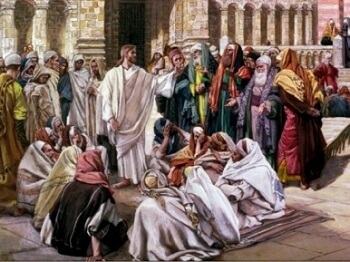
Remember the scene from the movie, Gone with the Wind, in which at the end of the work day one of the poor slaves in the field shouted, “quitten time”? Immediately another slave became angry and turned to his fellow slave and said, “It’s my job to say ‘quitten time.’” Even among the lowly slaves there was a need for one to feel superior to another—to be the designated “quitten time” announcer.
What is it about us humans that we need to find someone or some group that we view as “less than” we are? Isn’t that the basis of racial prejudice—to believe that our group is somehow superior to another group? How is it that we create a sense of self-importance based on being smarter, stronger, or richer than someone else?
Jesus addressed the “superiority” issue in one of his teachings (Matthew 23:1-12). He did so in reference to the attitudes of scribes and Pharisees who gloated in their superior positions in the Jewish culture.
“As for you, do not be called ‘Rabbi.’ You have but one teacher, and you are all brothers. Call no one on earth your father; you have but one Father in heaven. Do not be called ‘Master’; you have but one master, the Christ.”
What did Jesus mean by this? We must have teachers, fathers, and bosses in our lives, and we address them with respective titles. Is Jesus telling kids call their teachers “Sally” instead of “Mrs. Jones?” Or is he telling them to call their fathers “Pete” instead of “dad?” Or is he telling us to call our doctors “Liz” instead of “Dr. Smith?” Of course not. Jesus taught us to be respectful to those in leadership positions. In fact, regarding the scribes and Pharisees, he said:
“The scribes and the Pharisees have taken their seat on the chair of Moses. Therefore, do and observe all the things whatsoever they tell you, but do not follow their example.”
It wasn’t the fact that they taught the people about the Mosaic Law that was the problem; it was their attitude of superiority. They didn’t imitate the meekness of humility of Moses, but, rather, lorded it over the people.
Many of us are mothers, fathers, priests, sisters, teachers, doctors, supervisors or leaders of one kind or another. We can use our positions to make us feel superior to those in our charge, or we can use them to minister the presence of God to people. Mothers and fathers represent the fatherhood of God. When a child experiences the loving authority of a parent, she is experiencing the presence of God shining through them. We humans have the privilege of being “sacraments” to others—visible signs that bring about the invisible presence of God. Teachers allow Jesus to teach through them, and doctors allow the healing power of Jesus to flow through them. Jesus needs rabbis, fathers, and bosses to minister his grace to people. Rather than doing this with an attitude of superiority, however, they are to see themselves as servants of God and servants of those in their charge.
“The greatest among you must be your servant. Whoever exalts himself will be humbled; but whoever humbles himself will be exalted.”
When leaders act humbly and respectfully, those served start doing the same. We’ve all heard the saying “like father, like son.” Beneath our titles is a deeper truth: we are all brothers and sisters in Christ—sons and daughters of God. We don’t need a title to make us feel important. Isn’t being a brother, a sister, a son, or a daughter a more powerful basis of identity, than holding a title in society? Leaders can be servants because they are secure enough in their identity as children of God that they don’t have to rely on a title to feel important.
“Not for your sacrifices do I rebuke you, for your burnt offering is before me always” (Ps 50:8).
